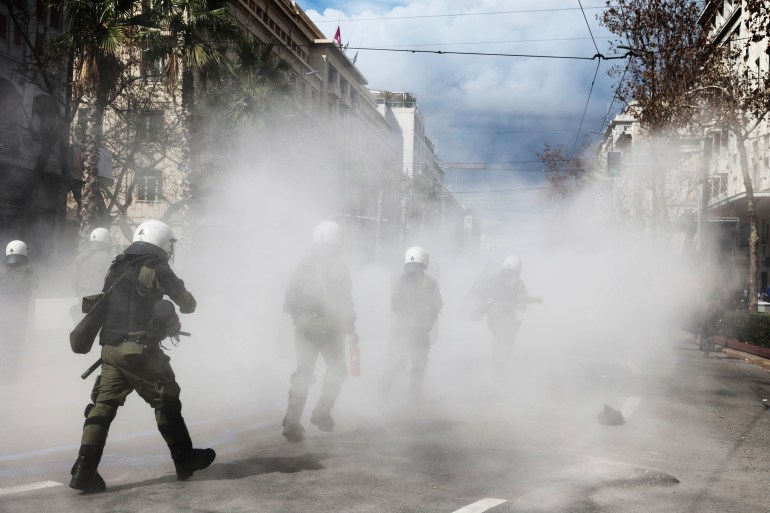Larissa stationmaster faces multiple charges of disrupting transport and putting lives at risk.
The 59-year-old man’s detention on Sunday came as clashes erupted between police and protesters in the Greek capital, Athens.
Thousands of people had rallied in the city to demonstrate for better safety regulation following the head-on collision between a passenger train and a freight carrier on the Athens-Thessaloniki route late in the evening of February 28.
The railway employee, who cannot be named under Greek law, was the stationmaster in the central city of Larissa, where the train crash took place.
He faces multiple charges of disrupting transport and putting lives at risk.
The transport safety charge potentially carries a life sentence, according to the eKathimerini newspaper.
“For about 20 cursed minutes he was responsible for the safety of the whole of central Greece,” his lawyer Stefanos Pantzartzidis said.
Pantzartzidis has previously said that his client was devastated and had assumed responsibility “proportionate to him”, but other factors were also at play, without elaborating.
Railway workers say the country’s rail network has been creaking under cost-cutting and underinvestment, a legacy of Greece’s debilitating debt crisis from 2010 to 2018.

Prime Minister Kyriakos Mitsotakis, who blamed the crash on human error, acknowledged that decades of neglect could have contributed to the disaster. “As prime minister, I owe everyone, but most of all the relatives of the victims, an apology,” he wrote on his Facebook account. “Justice will very fast investigate the tragedy and determine liabilities.”
Railway workers’ unions say safety systems throughout the rail network have been deficient for years as a remote surveillance and signalling system had not been delivered on time. They have called on the government to provide a timetable for the implementation of safety protocols.
Mitsotakis said that if there had been a remote system in place, “it would have been, in practice, impossible for the accident to happen”.
In Athens, some 10,000 people gathered by the large esplanade in front of parliament on Sunday to express sympathy for the lives lost and to demand better safety standards on the rail network.
“That crime won’t be forgotten,” protesters shouted as they released black balloons into the sky.
A placard read: “Their policies cost human lives.”
Many of the crash victims were students returning from a weekend break.
At least nine young people studying at Thessaloniki’s Aristotle University were among those killed on the passenger train.
The protests in Athens later descended into violence, with police accusing demonstrators of setting fire to rubbish bins and throwing Molotov cocktails. Police responded by firing tear gas and stun grenades to clear the square.
Seven officers were reportedly hurt, while five arrests were made.
